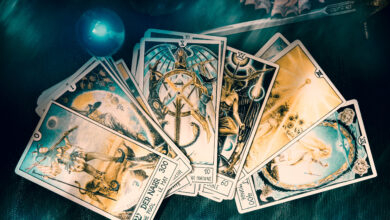What Your Star Sign Says About the Right Career For You

Whether you’re a long-time fan of poring over astrological charts or are new to the concept of celestial influence, you are probably already familiar with the idea that star signs can have a particularly vital effect on our personality traits and by extension on our paths through life.
Fans of astrology might argue that the intensity and creativity of an Aries or a Pisces may lead someone born under one of those star signs towards an artistic vocation. (Vincent van Gogh and Leonardo da Vinci were both Aries; Michelangelo was a Pisces.) Conversely, a deep potential for empathy combined with a practical nature may lead a Scorpio towards a career as a nurse or physician even while a creative streak leads them to pursue a separate vocation as an artist. (A Scorpio, the writer John Keats qualified in his youth as a surgeon but ultimately accomplished even greater things as a writer of lyrical poetry.)
Read More »Star Signs, Personality Types, and Vocations
Even without reading up on your own astrological sign, for example, you may have felt yourself drawn to particular lines of work or noticed particular strengths and interests that set you apart from your peers. Like many of us, you may also be frustrated with what you perceive as personal weaknesses that seem to work in tandem with your strengths.
If we’re willing to listen to what nature tells us, however, we’ll often find that these positive and negative qualities tend to lead us towards our vocations in life.
For example, vocations are different than the kinds of day jobs that we might take on merely to earn a bit of money; ideally, the two concepts can be mixed, but vocations in general tend to involve work that holds a deeper sense of meaning to us than the mere acquisition of a living. Qualities of a vocation include:
- Work that we would like to be remembered for
- Work that we would do even if we weren’t paid to do it
- Work that is deeply fulfilling on a spiritual level
- Work that utilizes our own unique talents and gifts
The Vocational Mindset
For some people, for example, a passion for the physical sciences might lead to a successful and fulfilling career as a physician. For others, a deep emotional connection to visual art might lead to work as a museum curator or as an artist.
Vocations tend to arise from our deepest interests and passions and tend to be manifestations of our deepest personality traits. They involve things that we’d do even if no one ever paid us to do them. When we think of our life’s work as a fulfillment of our spiritual gifts and personality traits, for example, it is easy to see how the qualities accorded to us by nature can determine what we should do with our lives in a meaningful sense.
What a Vocation Is (And Is Not)
This is not to say that the talents accorded to us by our star signs are simply tickets to wealth, glory, or social status. Finding a vocation is not about using our personal gifts to enrich ourselves at another’s expense but to use our gifts to aid our fellow human beings.
The word vocation comes from a Latin word for “to call”; and indeed, a vocation is a kind of call to service: For a composer like Ludwig van Beethoven, for instance, music was not a means to a better social life or to personal enrichment but a means to ennoble mankind. For artist Vincent van Gogh, furthermore, painting was a means of conveying an inner life to the outer world and a way to provide joy to others.
Understanding Our Inner Natures
How else can nature show us a path forward via our personality traits? Consider a person who tends to have an extremely consistent mood state from day to day: Whatever their life circumstances, such a person will likely be predictable in their actions. They’re the people you know are going to show up to work on time no matter what is going on in their world. If you’re in need of a life-saving surgical procedure, you’ll probably want someone like this on your local hospital staff.
Yet that same person is rarely spontaneous: Marriage to such a person is probably not going to involve spur-of-the-moment adventures or the excitement of an unplanned dinner outing. Predictability can be calming and reassuring; however, we don’t go to see adventure movies because they are predictable. But some people like the sense of calm that comes with predictability.
And people who demonstrate this kind of day-in day-out reliability may choose a career path that thrives on the work of stabile and level-headed personalities. Nurses, doctors, lawyers, airplane pilots, and military officers need to stay on their toes in even the most stressful situations. Society would very quickly break down if nature did not provide society with this type of personality!
Freewheeling Personalities and the Zodiac
Yet as much as we may appreciate the most stable people in our community, not everybody wants iron-clad predictability in their lives at all times!
Consider another personality type: This hypothetical person’s moods fluctuate from day to day because they tend to empathize with whoever they are interacting with at a given moment. On a cloudy and rainy day, you might find this person feeling a bit down; on a sunny day, they’re more cheerful. Their personalities are like sponges that soak up the environment around them.
One minute they’re excited about the possibilities of life; later on they are perhaps overcome with feelings of hopelessness. Their moods are as changeable as a spring sky: Sometimes it seems like rain clouds can evaporate and reveal a sunny day in the space of a few minutes. They’re the polar opposite of the unchangeable person we mentioned before.
Understanding the Creative Personality
These kinds of mood swings can seem intimidating to people who seek nonstop stability in life. But the same mood fluctuations are often counterbalanced by an intense kind of creativity: Where this individual is perhaps unsteady in their moods, they are often brilliant in their artistic creations.
Like Steve Jobs, they may have an innate knack for developing innovative new ideas. They’re the type of person who might paint you a very moving picture, solve an important math equation, patent a new piece of machinery, or write you a deeply meaningful song or poem. Without this personality type, society would lose many of its greatest thinkers. They’re the type of absent-minded professors like Albert Einstein who tend to think in highly original ways.
This is not to say that one personality type is better than another. Nature thrives on balance and provides people with gifts that work together in a kind of grand puzzle that we may not understand or perceive. We need stable neurosurgeons and attorneys just as much as we need impulsive and moody artists and scientists.
The Grand Symphony of Life
In other words, human society thrives in large part because of the ways in which these kinds of personality differences work in harmony on a grand scale almost like a symphony: Personality differences are a yin and yang that keeps the natural world in a kind of beautiful dynamic state of wholeness.
Whether we aspire to become business professionals and love the nine-to-five life or we feel compelled to pursue creative vocations as artists on our own terms, we can learn a lot from the story of Vincent van Gogh and from others like him: To discover our own unique path in life, we have to consider our natural strengths and our natural weaknesses in equal measure. To wit, we must embrace the kinds of diametrical opposites that nature presents us with even if they make our lives confusing and sometimes even difficult to manage.
At the end of the day, we can’t have the positive without embracing the negative; but at our best, we can learn to love both sides of our personalities and all that makes us who we are as individuals. Nature provides us with the tools to reach our full potential in life; however, it is up to us to learn how to use those tools effectively. And taking inventory of our genuine strengths and our genuine weaknesses is a great place to start.





